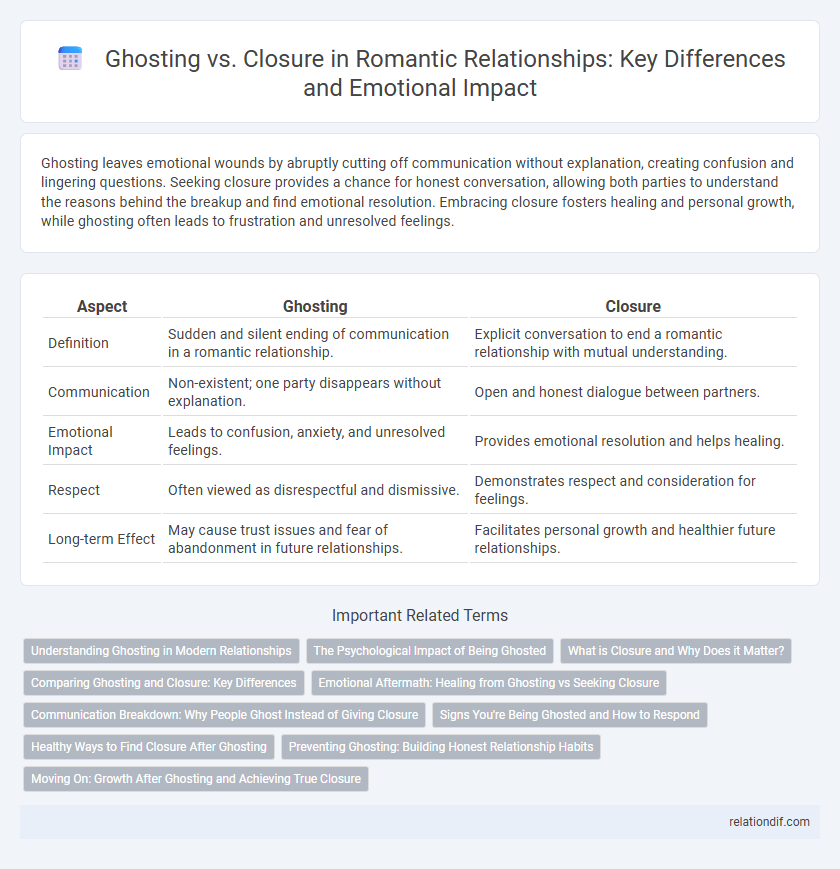Ghosting leaves emotional wounds by abruptly cutting off communication without explanation, creating confusion and lingering questions. Seeking closure provides a chance for honest conversation, allowing both parties to understand the reasons behind the breakup and find emotional resolution. Embracing closure fosters healing and personal growth, while ghosting often leads to frustration and unresolved feelings.
Table of Comparison
| Aspect | Ghosting | Closure |
|---|---|---|
| Definition | Sudden and silent ending of communication in a romantic relationship. | Explicit conversation to end a romantic relationship with mutual understanding. |
| Communication | Non-existent; one party disappears without explanation. | Open and honest dialogue between partners. |
| Emotional Impact | Leads to confusion, anxiety, and unresolved feelings. | Provides emotional resolution and helps healing. |
| Respect | Often viewed as disrespectful and dismissive. | Demonstrates respect and consideration for feelings. |
| Long-term Effect | May cause trust issues and fear of abandonment in future relationships. | Facilitates personal growth and healthier future relationships. |
Understanding Ghosting in Modern Relationships
Ghosting, a sudden and unexplained cessation of communication, reflects avoidance rather than confrontation in modern relationships, often leaving the ghosted partner with unresolved emotions and unanswered questions. This phenomenon highlights the challenges of seeking emotional closure, as the absence of dialogue disrupts the natural process of relationship endings and healing. Recognizing ghosting's impact reveals the growing need for honest communication to foster emotional clarity and respect in romantic connections.
The Psychological Impact of Being Ghosted
Being ghosted often triggers feelings of confusion, anxiety, and lowered self-esteem, as the sudden lack of communication leaves unresolved emotional questions. The absence of closure disrupts the natural grieving process, making it difficult for individuals to move on from the romantic relationship. Studies in psychology highlight that this ambiguous loss can lead to long-term emotional distress and challenges in forming future intimate connections.
What is Closure and Why Does it Matter?
Closure in romance refers to the emotional resolution and understanding achieved after a relationship ends, allowing individuals to process their feelings and move forward confidently. It matters because without closure, unresolved questions and lingering emotions can lead to confusion, anxiety, and difficulty in forming new relationships. Achieving closure promotes healing, emotional clarity, and healthier future romantic connections.
Comparing Ghosting and Closure: Key Differences
Ghosting involves abruptly ending communication without explanation, leaving the other person confused and emotionally unsettled. Closure provides a clear conversation that addresses feelings, resolves misunderstandings, and allows both individuals to move on with emotional clarity. The key difference lies in the intentionality and respect for emotional health, where closure promotes healing while ghosting causes uncertainty and prolonged distress.
Emotional Aftermath: Healing from Ghosting vs Seeking Closure
Healing from ghosting often involves navigating feelings of abandonment and unresolved questions that can prolong emotional distress. In contrast, seeking closure allows individuals to confront the situation directly, facilitating acceptance and emotional resolution. Understanding these differences is crucial for developing effective coping strategies in romantic relationships.
Communication Breakdown: Why People Ghost Instead of Giving Closure
Ghosting often occurs due to fear of confrontation and the discomfort of delivering honest communication, leading to a sudden stop in contact without explanation. Many individuals avoid closure to escape potential emotional conflict, leaving the other party confused and seeking answers. This communication breakdown emphasizes anxiety and avoidance behavior as key reasons behind why people ghost instead of providing closure in romantic relationships.
Signs You're Being Ghosted and How to Respond
Noticeable signs you're being ghosted include unanswered messages, lack of engagement in conversations, and sudden disappearance from social media interactions. Respond by giving space while seeking clarity through a respectful message expressing your feelings and expectations. Prioritizing self-respect and moving forward emotionally helps maintain personal well-being during ambiguous romantic situations.
Healthy Ways to Find Closure After Ghosting
Experiencing ghosting in a romantic relationship can leave emotional wounds that hinder healing and growth. Engaging in self-reflection, seeking support from trusted friends, and practicing mindfulness techniques are effective strategies to regain emotional balance and find closure. Prioritizing self-care and setting personal boundaries empowers individuals to move forward with resilience and fosters healthier future relationships.
Preventing Ghosting: Building Honest Relationship Habits
Preventing ghosting in romantic relationships requires cultivating transparent communication and setting clear expectations from the start. Consistently expressing feelings and concerns fosters trust and reduces misunderstandings that often lead to sudden silence. Establishing honest relationship habits creates a foundation where both partners feel safe to seek closure instead of disappearing.
Moving On: Growth After Ghosting and Achieving True Closure
Experiencing ghosting often leaves emotional wounds that hinder moving on, yet personal growth emerges by embracing self-reflection and rediscovering self-worth. Achieving true closure involves acknowledging unresolved feelings while consciously choosing to release the past, fostering resilience and emotional clarity. This transformative process empowers individuals to build healthier future relationships founded on mutual respect and honest communication.
Ghosting vs Closure Infographic

 relationdif.com
relationdif.com